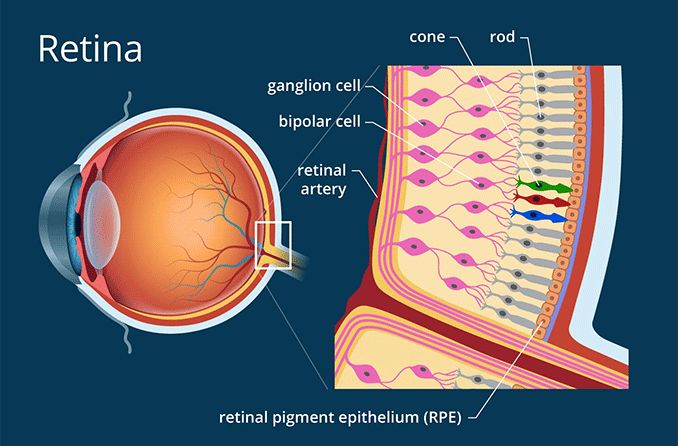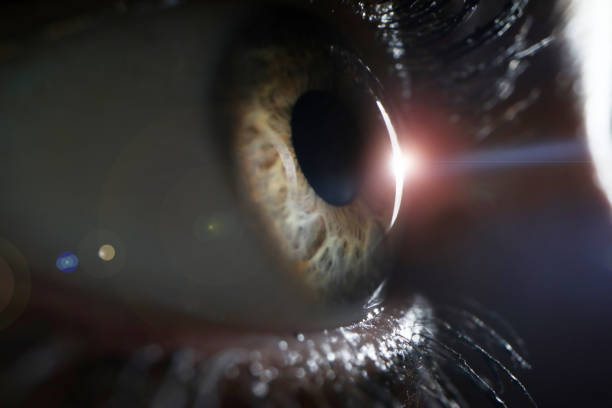Service Details
Retina
The retina is the light-sensitive layer at the back of the eye, crucial for processing visual information and sending it to the brain. Damage to the retina can impair vision and lead to blindness if untreated.

What is the Retina?
The retina is a thin layer of tissue located at the back of the eye, responsible for receiving and processing light. It converts light into electrical signals, which are then sent to the brain through the optic nerve, allowing us to see. The retina plays a crucial role in vision, and damage to it can lead to visual impairment or blindness.
Structure of the Retina
The retina consists of several layers, each containing specialized cells that work together to detect light and process visual information:
-
Photoreceptors: These cells are responsible for detecting light and come in two types:
- Rods: Sensitive to low light levels and responsible for night vision.
- Cones: Detect color and are concentrated in the macula, a small area in the center of the retina.
-
Macula: The macula is the central part of the retina responsible for sharp, detailed central vision and color perception.
-
Retinal Ganglion Cells: These cells receive information from the photoreceptors and transmit it to the optic nerve.
-
Optic Nerve: The optic nerve carries the electrical signals generated by the retina to the brain, where they are interpreted as images.
Functions of the Retina
The retina’s main function is to process light into signals that the brain can interpret. Here's how it works:

- Light Detection: Light enters the eye through the cornea, passes through the lens, and is focused onto the retina.
- Phototransduction: Photoreceptors in the retina (rods and cones) convert light into electrical signals.
- Signal Transmission: These electrical signals are processed by other retinal cells and then sent to the brain through the optic nerve.
- Image Perception: The brain processes these signals to create the images we see.
Conditions Affecting the Retina
Several conditions can affect the retina, leading to vision problems:
- Retinal Detachment: The retina separates from the back of the eye, which can cause vision loss if not treated promptly.
- Diabetic Retinopathy: Caused by damage to the retinal blood vessels due to high blood sugar levels, often seen in people with diabetes.
- Macular Degeneration: A condition that affects the macula, leading to central vision loss. It is most common in older adults.
- Retinitis Pigmentosa: A group of genetic disorders that lead to gradual degeneration of the retina, causing night blindness and peripheral vision loss.
Symptoms of Retinal Problems
Common symptoms of retinal issues include:
- Blurred or distorted vision.
- Sudden flashes of light.
- Floaters (small spots that drift through your field of vision).
- A shadow or curtain over part of your visual field.
- Loss of central vision (often associated with macular degeneration).
Diagnosis of Retinal Disorders
Retinal disorders are diagnosed through a comprehensive eye exam that may include:
- Visual Acuity Test: Measures the clarity of your vision.
- Ophthalmoscopy: A device is used to look at the back of your eye, including the retina and optic nerve.
- Optical Coherence Tomography (OCT): A non-invasive imaging test that provides detailed images of the retina's layers.
- Fluorescein Angiography: A dye is injected into your bloodstream, and photographs are taken to show blood flow in the retina.
Treatment for Retinal Conditions
Treatment depends on the specific condition affecting the retina:
- Laser Surgery: Used to repair retinal tears or seal leaking blood vessels in conditions like diabetic retinopathy.
- Vitrectomy: A surgical procedure to remove the gel (vitreous) from the eye and repair a detached retina or other severe retinal conditions.
- Injections: Medications, like anti-VEGF (vascular endothelial growth factor) drugs, can be injected into the eye to slow the progression of diseases like macular degeneration or diabetic retinopathy.
- Photodynamic Therapy: A light-sensitive drug is injected into a vein, and a laser is used to activate the drug to treat abnormal blood vessels in the retina.
Preventing Retinal Problems
.jpg)
While some retinal conditions are inherited or age-related, certain measures can help protect the retina:
- Regular Eye Check-Up: Early detection of retinal issues can prevent severe vision loss.
- Managing Health Conditions: Controlling diabetes and hypertension can reduce the risk of retinal damage.
- Protecting Eyes from UV Light: Wearing sunglasses can help protect your eyes from harmful ultraviolet rays.
- Maintaining a Healthy Lifestyle: A balanced diet rich in antioxidants and regular physical activity can support eye health.